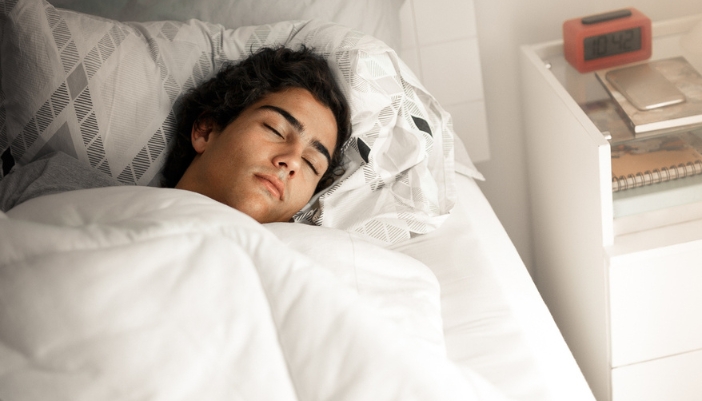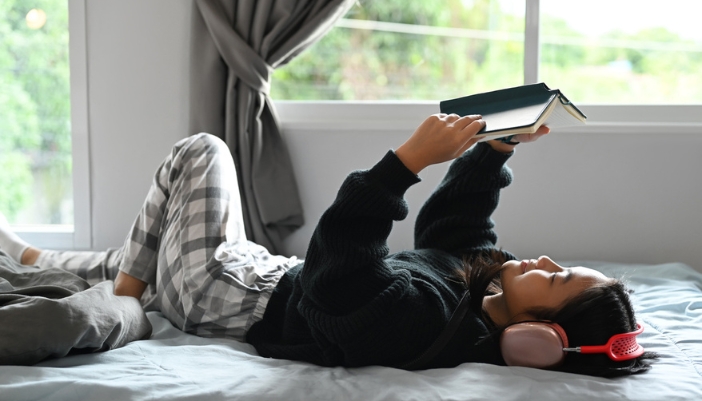Do you feel like your child hit thirteen and turned into a night owl, staying up late and struggling to get up in the morning? It's not just defiance or a love for late-night screen time — there's actually a lot going on in their brains and bodies that affects their sleep.
Understanding the science behind teen sleep can help us better support their health and well-being. At Sav-Mart, we know how crucial a good night's sleep is, and we're here to help you navigate these teenage years with some practical tips and insights!

Teen Sleep: The Inside Scoop
The first step to understanding the mystery behind your teen’s sleep is understanding exactly why their sleep needs differ from adults and younger children. As you know, sleep has different stages like light sleep, deep sleep, and REM (rapid eye movement), and each is essential for feeling rested and recharged. But the big difference setting teens apart from adults achieving each sleep cycle is one unexpected thing—timing!
Thanks to puberty, teenagers experience a shift in their internal clock, known as "sleep phase delay." This shift means their bodies naturally feel sleepy later at night, and they want to sleep later in the morning. One of the main reasons for this delay is the change in the release of melatonin, the sleep hormone. In teenagers, melatonin is released later in the evening, making it harder for them to fall asleep early. Unfortunately, early school start times don't align with this natural schedule, often leaving teens with insufficient sleep.

A Sneak Peak into the Teenage Brain
Sleep is an essential factor for everyone. But when the body and mind are going through so many changes (thanks, puberty), good sleep is imperative for your teen's cognitive function, emotional regulation, and physical health!
- Cognitive Function: During sleep, the brain processes and consolidates information learned throughout the day. Lack of sleep can lead to difficulties in concentration, problem-solving, and remembering things, negatively impacting school performance.
- Emotional Regulation: Teens who don't get enough sleep are more likely to experience mood swings, irritability, and stress (plus, it can add to feelings of anxiety/depression!). Getting enough sleep helps stabilize mood and improves overall emotional health, making it easier for teens to handle their social and academic lives.
- Physical Health: Teens are in a critical period of growth and development, and sleep is when the body repairs and grows to provide energy, coordination, and a healthy immune system!

Easy Tips for Helping Your Teen Catch More Z's
While it might feel impossible to set your teen’s sleep to rights, don’t lose hope — it’s simpler than you think! With a few practical tips, and consistency, you’ll be amazed at the difference!
- Positive Sleep Associations: Focusing on calming thoughts or visualizing peaceful scenes as your teen falls asleep can ease anxiety and help them drift off more easily.
- Digital Detox: Try keeping devices out of the bedroom or use apps like Freedom to block distractions at night. Reducing screen time, especially with “Night Shift” settings, can help cut down on the blue light that messes with melatonin.
- The “Plus Two” Rule: Let your teen sleep in on weekends, but try to limit it to two hours beyond their usual wake-up time. This helps them catch up on rest without throwing off their sleep schedule.
- Caffeine Curfew: Set a cut-off time for caffeine in the early afternoon. Avoiding caffeine after lunch can help prevent it from interfering with sleep.
- Bed = Sleep Zone: Encourage your teen to use their bed only for sleeping. Studying, gaming, or scrolling in bed can make it harder to associate the bed with relaxation and sleep.
- Active Days, Restful Nights: Physical activity and outdoor time during the day can help your teen fall asleep more easily at night. Just make sure they wind down before bedtime.
Sleep: Your Teen's Secret Weapon
As you can see, sleep is more than rest; it's a cornerstone of your teenager's health and happiness! Thankfully, with a few adjustments and patience, you can significantly improve their cognitive function, emotional welfare, and physical health.
And if you (or your teenager) think an old mattress is part of their difficulty falling asleep, don’t hesitate to upgrade their bed at Sav-Mart! A mattress that fully supports their changing body is a must! But if you have trouble finding the best fit, don’t worry; our team is happy to answer any questions.